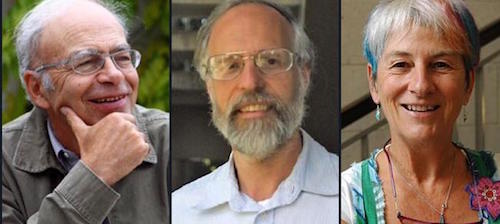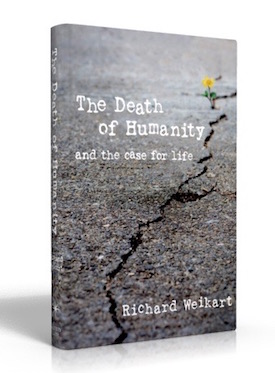 Culture & Ethics
Culture & Ethics
 Evolution
Evolution
 Faith & Science
Faith & Science
In a Debate with Peter Singer, Richard Weikart Drills Down to the Bottom of Atheist Ethics

Just when you are thinking regretfully about how our critics flee from a fair fight on relevant issues, preferring instead to rule out views they don’t like by definition or fiat, along comes Peter Singer.
Dr. Singer, Princeton University’s celebrated atheist bioethicist with some disturbing notions about the worth of a human life, debated our friend and colleague Richard Weikart on the question of life’s inherent purpose or dignity. They did so on the excellent and highly substantive British radio program Unbelievable? with host Justin Brierley. Listen to it here.
 Dr. Weikart, the historian and author most recently of The Death of Humanity: And the Case for Life, took on Singer and then, when Singer needed to hang up and go on his way, Weikart took on another atheist, Susan Blackmore. The four of them deserve credit for casting their votes in favor of civil and lucid intellectual engagement. This one runs to more than an hour and twenty minutes. But that’s Brierley’s MO — he has hosted many detailed and fascinating interactions in the past, including Stephen Meyer versus UC Berkeley paleontologist Charles Marshall.
Dr. Weikart, the historian and author most recently of The Death of Humanity: And the Case for Life, took on Singer and then, when Singer needed to hang up and go on his way, Weikart took on another atheist, Susan Blackmore. The four of them deserve credit for casting their votes in favor of civil and lucid intellectual engagement. This one runs to more than an hour and twenty minutes. But that’s Brierley’s MO — he has hosted many detailed and fascinating interactions in the past, including Stephen Meyer versus UC Berkeley paleontologist Charles Marshall.
A few observations. First, in an encounter like this where everyone speaks intelligently and answers challenges rather than dodging them, the real “winner” is the audience. To paraphrase Dennis Prager, there’s no treasure more precious than clarity — getting to the bottom of what someone actually thinks and is saying.
Second, while admitting bias, I believe Weikart triumphed in drilling down to the bottom of what Singer was saying. Richard pressed him on how, in the absence of a designer behind nature who grants meaning to existence and underwrites our ideas of right and wrong, we can say that a world with more pleasure and less pain is a better thing the opposite. Singer’s answer was that he knows for himself that pain is bad for him, and everyone knows the same for himself about himself, and thus you can extrapolate outward — a happy world is to be preferred and pursued by all over a suffering one.
But the extrapolation is where secular ethics becomes a mere assertion of unjustified opinion. As everyone on the show concurred, plenty of people couldn’t give a flip about the suffering of other human beings. Caring about other people and about the world has no objective quality of “ought” about it. Singer’s extrapolation won’t get you there.
Third, I was struck by the degree to which the conversation, first with Singer then with Blackmore, had evolution as its backdrop. They both brought it up. For Singer, unguided evolution is precisely how he knows, or thinks he does, that the world is without purpose.
Singer is careful to say he is not a believer in evolutionary ethics, in the sense of moral ideas that follow from the fact, as he sees it, of Darwinian evolution. But living in a cosmos resulting from random, undirected churning is why he, like Susan Blackmore, insists that life can’t have an ultimate, objective meaning. For their candor, congratulations are owed to both atheist proponents.
Photo: Peter Singer, Richard Weikart, Susan Blackmore, via Premier Christian Radio.
